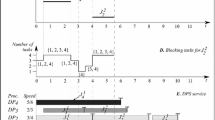Abstract
We consider the issue of deadline tardiness under global multiprocessor scheduling algorithms. We present a general tardiness-bound derivation that is applicable to a wide variety of such algorithms (including some whose tardiness behavior has not been analyzed before). Our derivation is very general: job priorities may change rather arbitrarily at runtime, capacity restrictions may exist on certain processors, and, under certain conditions, non-preemptive regions are allowed. Our results show that, with the exception of static-priority algorithms, most global algorithms considered previously have bounded tardiness. In addition, our results provide a simple means for checking whether tardiness is bounded under newly-developed algorithms.
Similar content being viewed by others
References
Anderson J, Srinivasan A (2004) Mixed Pfair/ERfair scheduling of asynchronous periodic tasks. J Comput Syst Sci 68(1):157–204
Bisson S (2006) Azul announces 192 core Java appliance. http://www.itpro.co.uk/servers/news/99765/azul-announces-192-core-java-appliance.html
Block A, Leontyev H, Brandenburg B, Anderson J (2007) A flexible real-time locking protocol for multiprocessors. In: Proceedings of the 13th IEEE international conference on embedded and real-time computing systems and applications, pp 71–80
Brandenburg B, Anderson J (2007) Integrating hard/soft real-time tasks and best-effort jobs on multiprocessors. In: Proceedings of the 19th Euromicro conference on real-time systems, pp 61–70
Calandrino J, Anderson J (2008) Cache-aware real-time scheduling on multicore platforms: Heuristics and a case study. In: Proceedings of the 20th Euromicro conference on real-time systems, pp 209–308
Chakraborty S, Kunzli S, Thiele L (2003) A general framework for analysing system properties in platform-based embedded system designs. In: Proceedings of the conference on design, automation and test in Europe, vol 1
Chetto H, Chetto M (1989) Some results of the earliest deadline scheduling algorithm. IEEE Trans Softw Eng 15(10):1261–1269
Devi U (2006) Soft real-time scheduling on multiprocessors. PhD thesis, University of North Carolina, Chapel Hill, NC
Devi U, Anderson J (2004) Improved conditions for bounded tardiness under EPDF fair multiprocessor scheduling. In: Proceedings of 12th international workshop on parallel and distributed real-time systems
Devi U, Anderson J (2005) Tardiness bounds for global EDF scheduling on a multiprocessor. In: Proceedings of the 26th IEEE real-time systems symposium, pp 330–341
Devi U, Anderson J (2006) Flexible tardiness bounds for sporadic real-time task systems on multiprocessors. In: Proceedings of the 20th IEEE international parallel and distributed processing symposium on CDROM
Devi U, Anderson J (2008) Tardiness bounds for global EDF scheduling on a multiprocessor. Real-Time Syst 38(2):133–189
Devi U, Leontyev H, Anderson J (2006) Efficient synchronization under global EDF scheduling on multiprocessors. In: Proceedings of the 18th Euromicro conference on real-time systems, pp 75–84
Farivar C (2006) Intel developers forum roundup: four cores now, 80 cores later. http://www.engadget.com/2006/09/26/intel-developers-forum-roundup-four-cores-now-80-cores-later/
Jeffay K, Stone D (1993) Accounting for interrupt handling costs in dynamic priority task systems. In: Proceedings of the 14th IEEE symposium on real-time systems, pp 212–221
Leontyev H, Anderson J (2007a) Generalized tardiness bounds for global multiprocessor scheduling. In: Proceedings of the 28th IEEE real-time systems symposium, pp 413–422
Leontyev H, Anderson J (2007b) Tardiness bounds for EDF scheduling on multi-speed multicore platforms. In: Proceedings of the 13th IEEE international conference on embedded and real-time computing systems and applications, pp 103–111
Leontyev H, Anderson J (2007c) Tardiness bounds for FIFO scheduling on multiprocessors. In: Proceedings of the 19th Euromicro conference on real-time systems, pp 71–80
Leontyev H, Anderson J (2008) A hierarchical multiprocessor bandwidth reservation scheme with timing guarantees. In: Proceedings of the 20th Euromicro conference on real-time systems, pp 191–200
Liu J (2000) Real-time systems. Prentice-Hall, Englewood Cliffs
Piao X, Han S, Kim H, Park M, Cho Y, Cho S (2006) Predictability of earliest deadline zero laxity algorithm for multiprocessor real-time systems. In: Proceedings of the 9th IEEE international symposium on object and component-oriented real-time distributed computing, pp 359–364
Shin I, Easwaran A, Lee I (2008) Hierarchical scheduling framework for virtual clustering of multiprocessors. In: Proceedings of the 20th Euromicro conference on real-time systems, pp 181–190
Stoica I, Abdel-Wahab H, Jeffay K, Baruah S, Gehrke J, Plaxton C (1996) A proportional share resource allocation algorithm for real-time, time-shared systems. In: Proceedings of the 17th IEEE real-time systems symposium, pp 288–299
Author information
Authors and Affiliations
Corresponding author
Rights and permissions
About this article
Cite this article
Leontyev, H., Anderson, J.H. Generalized tardiness bounds for global multiprocessor scheduling. Real-Time Syst 44, 26–71 (2010). https://doi.org/10.1007/s11241-009-9089-2
Published:
Issue Date:
DOI: https://doi.org/10.1007/s11241-009-9089-2




